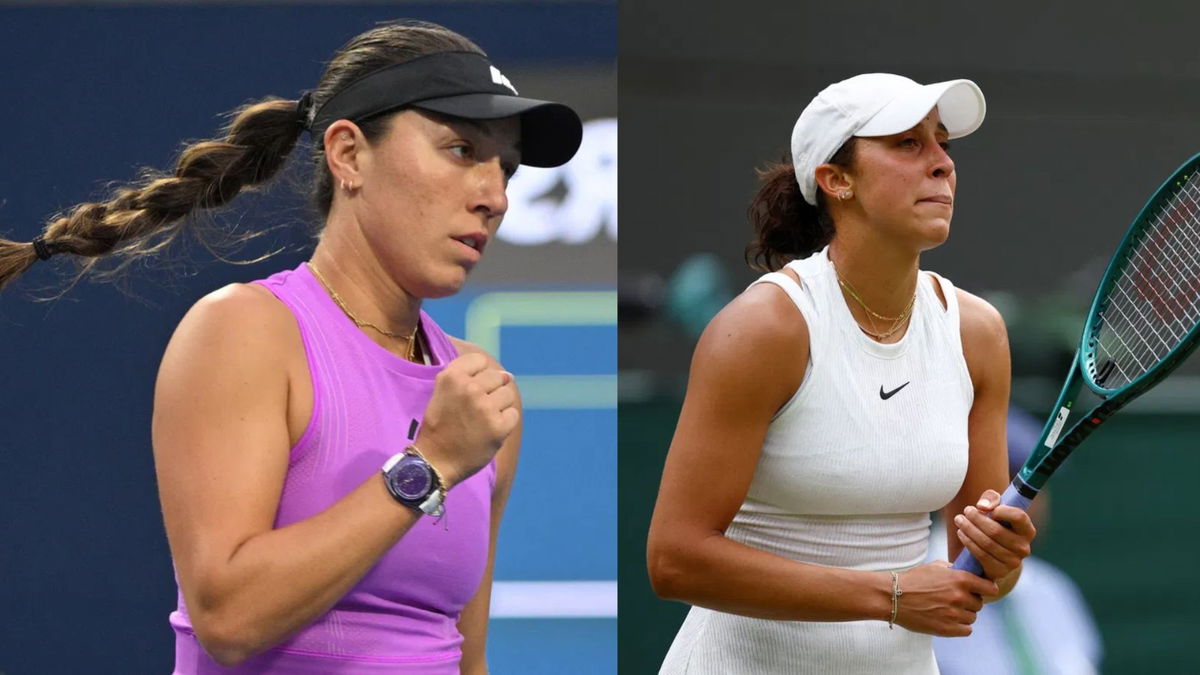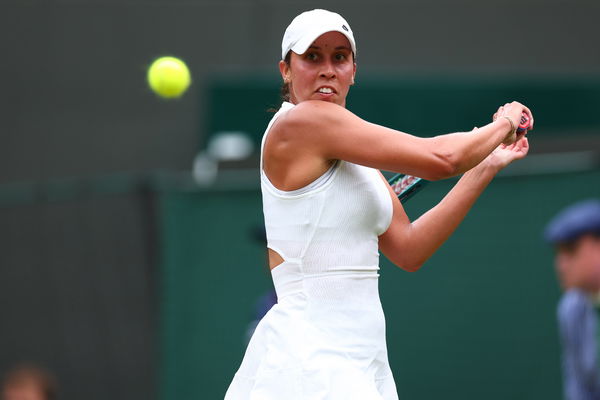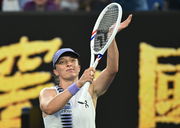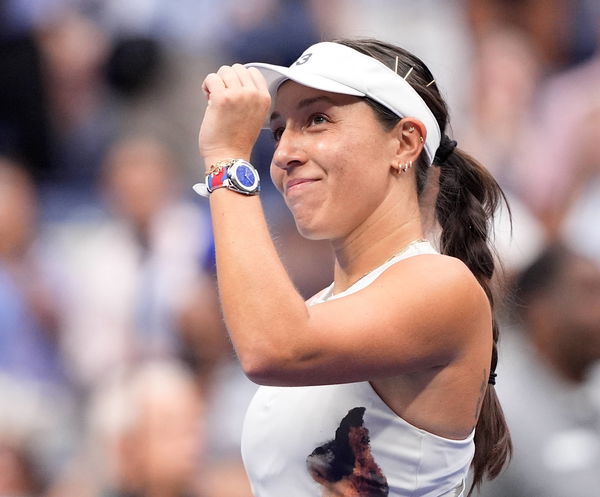
Imago
Image Credits: Imago

Imago
Image Credits: Imago
Coco Gauff captured it perfectly last year, calling the Asian swing “a bit isolated,” admitting, “Especially in swings like Asia where it maybe is more isolated than usual, we just play Uno lot.” That raw honesty sums up the brutal grind, leaving the US Open and diving straight into weeks of travel, time zones, and mental battles. With this year’s swing already in motion at the Korea Open, Madison Keys and Jessica Pegula have stepped in, laying bare the hardest parts, from endless flights to finding focus, showing fans the true cost of staying competitive on tour.
Watch What’s Trending Now!
The WTA stars Madison Keys, Jessica Pegula, Jennifer Brady, and Desirae Krawczyk have taken a fresh leap into storytelling with their newest venture: The Player’s Box Podcast. Launched just a few weeks ago, this project gives the four American players a chance to speak freely, not just about tennis but also about the unseen sides of life on tour, the flights, the fatigue, and the moments that test their resilience. And when the conversation turned toward the Asian swing, Madison Keys didn’t hold back.
Keys, who withdrew from the Billie Jean King Cup, was the first to take the mic. “The courts are great. The hotels are so nice. The gym is always really good. It’s just like the long I feel like it’s hard because it’s like you start the year with the really long flight and then you end the year with the really long flight,” she shared. Her words struck a chord with anyone who’s felt the wear of endless travel.
ADVERTISEMENT
She continued, adding a sharp observation about the mental challenge. “So, I think that’s always just kind of especially for I mean us Americans that I think we get a little comfortable just being able to be in the States for like six weeks and then we’re like that 27 hour flight option doesn’t seem amazing.” The honesty of that line, a mix of humor and reality, perfectly painted the picture of what players go through just to show up on court.

Imago
RECORD DATE NOT STATED 7th July 2024 All England Lawn Tennis and Croquet Club, London, England Wimbledon Tennis Tournament, Day 7 Madison Keys USA in action during her fourth round match against Jasmine Paolini ITA PUBLICATIONxNOTxINxUK ActionPlus12665641 ShaunxBrooks
Jessica Pegula, who was already in China preparing to lead Team USA at the Billie Jean King Cup, then chimed in with her own travel story, one that sounded more like a military operation than a tennis trip. “I have to go Florida to LA, LA to Hong Kong, and then I have to drive and because you have to fly and then drive to Shenzhen, which is like maybe two hours. I’m not sure,” she explained.
ADVERTISEMENT
Pegula didn’t stop there, adding a detail that made everyone nod in sympathy. “But you have to go over the border. So, you have to go like into mainland China. And I think I land at like 7:00 a.m. So, Monday is going to be an absolute grind for me. I’m going to adjust later in the day, but we’ll see how that works out.” It was the kind of raw insight that fans rarely get to hear, the travel grind behind the glamorous highlight reels.
Nine months of nonstop action have brought the WTA Tour to its final chapter, the Asian swing. With the Grand Slam calendar closing after the US Open, the last WTA 1000 events now unfold at the Dongfeng Voyah, Wuhan Open, followed by the remaining WTA 500s in Ningbo and Tokyo. For the elite players, this stretch isn’t just about finishing the season; it can completely rewrite the story of their year.
ADVERTISEMENT
Top Stories
John McEnroe Breaks Silence on the Potential of Coaching Carlos Alcaraz After Australian Open

Iga Swiatek at the Center of a Possible WTA Shake-Up After 4-Time Slam Winner Speaks Out

Ukrainian Tennis Media Calls Out WTA’s Silence on Player Support

Australian Open Star Who Defeated Jannik Sinner to Win $1M Gets His Tennis’ Biggest Call

Emma Raducanu’s Coaching Turmoil Sparks Sharp Questions From Tennis Legend: “Who’s Making Those Decisions?

Coco Gauff summed up the mental challenge best, saying last year, “It’s kind of weird because your brain is like the Grand Slams are over so you’re kind of relaxed. But it’s a lot of points, a lot of money at stake. It’s two 1000s left and there’s a couple of 500s. They’re big tournaments and you want to win them.” Her words captured that tug-of-war between fatigue and ambition that so many players face.
Even Pegula, coming off a tough US Open defeat to Aryna Sabalenka, has emphasized how high the stakes really are. “A lot of people think after the US Open it’s done, but no,” she reminded. “There are two very big events that can really change the course of the end of the year. Especially for top players, the end of the year rankings and end of the year Race, that’s really important. That’s something we’re really focused on.”
2023 proved that point perfectly when Iga Swiatek used the Asian swing to mount a late surge, reclaiming the No. 1 ranking from Sabalenka in the very last match of the season. “You put in a lot of work throughout the whole year so now that it’s the end, have some appreciation for getting through most of the year,” Pegula said. “It’s the last swing, give it everything you got. There’s still a lot at stake. I think some people either tend to shut down or dread this part of the year but you have to kind of find a way to refresh and reset.”
ADVERTISEMENT
And now, as Keys and Pegula laugh and vent about the grind on The Player’s Box Podcast, fans get to see their reality, the endless flights, the border crossings, the mental resets. Keys will launch her Asian swing at the China Open, while Pegula continues to grind it out in Shenzhen. Together, their words remind us that professional tennis isn’t just about swinging a racket; it’s about surviving the road, staying sharp, and still finding the fire to compete.
Jessica Pegula urged to capture a Grand Slam title soon
Unlike Madison Keys, who captured the Australian Open earlier this year, Jessica Pegula is still chasing her elusive first major. Last year’s US Open heartbreak, where she came agonizingly close, remains the nearest she has been to lifting a Grand Slam trophy.
ADVERTISEMENT
Pegula has spoken about tweaks to her game this season, and her semifinal clash with Aryna Sabalenka at Flushing Meadows was widely hailed as one of the tournament’s best matches. Yet for Pegula, the narrative of “so near yet so far” persists, as inconsistency continues to snatch away her biggest opportunities.
Her best chances remain on hard courts, the surface where she thrives. Melbourne and New York have consistently been her playgrounds, with three Australian Open quarterfinals and a US Open quarterfinal, semifinal, and final already under her belt. Those results have kept her firmly in the conversation as a major contender.

Imago
Tennis: US Open Aug 29, 2025 Flushing, NY, USA Jessica Pegula USA after beating Victoria Azarenka not pictured on day six of the 2025 U.S. Open tennis tournament at the USTA Billie Jean King National Tennis Center. Flushing USTA Billie Jean King National Tennis Center. NY USA, EDITORIAL USE ONLY PUBLICATIONxINxGERxSUIxAUTxONLY Copyright: xRobertxDeutschx 20250829_jla_jo9_128
But the numbers also reveal a frustrating pattern. Pegula has crashed out in the first round of Grand Slams seven times, an alarming stat for someone of her caliber. And with each passing year, the urgency only grows louder.
ADVERTISEMENT
2026 feels like a defining moment for Pegula’s career. At 31 years old, and turning 32 shortly after the next Australian Open, time is no longer an ally. History looms over her, with Flavia Pennetta’s record as the oldest first-time Grand Slam winner, 33 years and 199 days, providing a daunting benchmark.
Pegula is already older than Francesca Schiavone was when she captured the French Open, further intensifying the pressure. The task ahead is clear: break through before age and history shut the window for good.
ADVERTISEMENT
Yet Pegula’s story is not one of despair but of relentless belief. A fan favorite for her composure and charm, she remains one of the most respected players on tour. 2026 could well be the year she silences all doubts and finally joins the club of Grand Slam champions, perhaps as one of the oldest first-time winners the sport has ever seen.
ADVERTISEMENT
ADVERTISEMENT
ADVERTISEMENT
